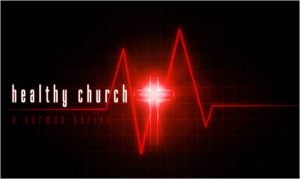
Acts 2:41-47
What is a healthy church? 1 Corinthians 12 describes the church as a body, with each part functioning well so that the whole body is healthy. But we are all broken and hurting people, how can we function together as a healthy body?
In Acts 2, we have a model of a healthy church. One hundred and twenty followers of Jesus, waiting in the upper room, were filled with the Holy Spirit and they went into the streets proclaiming the Gospel message. Three Thousand people were added to the church that day and this same church has influenced every church for the past two thousand years. But what was their secret?
The past three months have been filled with mission trips and praying for those going out to share the message of the Gospel, focusing on the lost in our city and across the nations.
This is all good, but a church that only looks at missions without caring about the discipleship of the members is not healthy. Just like a church that focuses only inward is not healthy.
There needs to be a balance of equipping (discipleship) and mission (going out).
Athletic trainers will tell you that a strong core is vital for all the body to function well, and spend hours strengthening the core. If the core is weak, the whole body is weak and cannot operate at its best. The same applies to the analogy of the church as a body. If the core of the church is weak, the whole body does not function well.
The early church was more than a gathering of like-minded believers who came together once a week for a time of fellowship and worship. It was a body of fully committed people, committed to the lordship of Jesus Christ personally, and committed to each other in fellowship and unity. This church was the healthiest and most effective the church has ever been.
Acts 2:42 begins with the phrase, “And they devoted themselves to the Apostles’ teaching…”
Devotion means a regular observance. Individual committed devotion is a sign of genuine salvation. Someone who does not desire to spend time daily in God’s word is probably not filled with the Holy Spirit and probably not saved. Saying that you do not desire to read God’s Word regularly is like saying that you are alive, but don’t need to drink water. The foundational mark of a true believer is someone who abides in Christ, who feeds on God’s word (see John 8:31).
So, what were they teaching? The Apostles had sat under the greatest teacher of all time for three years. In the upper room at Pentecost, they were filled with the Holy Spirit, the Spirit of truth and now they were teaching the new believers who in turn taught others. This is the pattern of the early church and sadly something that we have lost in the church. We have developed this understanding that only the pastor or person who has a master’s degree in theology can teach. We all need to carefully study doctrine, know what we believe, why we believe it and then be able to teach it. This message is intended to come to us and then flow through us (2 Timothy 2:2).
In the Great Commission (Matthew 28:19-20), Jesus commands all of us to make disciples, to win converts and disciple them. This is not only a command to go to the ends of the earth, but also to the person sitting next to you, or the young person who is desperate for a mentor, a role model to help them walk out the Christian life in the twenty-first century.

The Dead sea is the lowest body of water on the planet and lies between Israel and Jordan. The river Jordan flows into it from the sea of Galilee but does not flow out of it. As a result, the Dead sea has ten times the concentration of salt than the oceans and is unable to sustain any life. This is a picture of many individuals and even churches who pride themselves on their theological knowledge, amassing more and more teaching, but never applying the word.
Such people and churches are deep, salty and dead!
A healthy body of water allows the life-giving resource to flow in and then out again, feeding another pond or stream. Are you stagnating on the word? Or are you allowing the word to flow through you to others?
The early church focused on the resurrection of Jesus and the Gospel message, they preached John 14:6. The Gospel is the good news that Jesus is the eternal Son of God, who spoke all of creation into being. He came to earth in the form of a baby, his mother Mary conceived by the Holy Spirit. Jesus lived a perfect life, he was crucified and buried, but he rose again on the third day, overcoming death and paying the price of the judgment of God for our sins. This Jesus ascended into heaven, where he is seated at the right hand of the Father and where he is preparing praying for us and preparing a place for us to be with him. This same Jesus is coming again to restore all things and judge the earth.
This Gospel message is the message that saves us, but it is also the message that sustains us and keeps us growing in our own personal walk with the Lord. John Piper said, “Therefore, the gospel is the power that gives us victory over temptation to despair and to pride and to greed and to lust. The gospel alone can triumph over every obstacle and bring us to eternal joy.”
We have the blessing of the eternal Word of God and a healthy church loves to devote themselves to the Word of God (2 Timothy 3:16-17 and Hebrews 4:12).
The church and individual that studies and meditates on the Word of God will be healthy.
Jonathan Edwards, the 18th century theologian defined 5 metrics for determining a genuine move of the Holy Spirit in a church.
- A growing esteem for Jesus Christ.
- A discernible spirit of repentance.
- A dogged devotion to the Word of God.
- An interest in theology and doctrine.
- An evident love for God and neighbor.
Are you healthy?
Pray that God the Holy Spirit gives you a passion for the Word of God, and it will bring you life (Proverbs 4:20-22).

